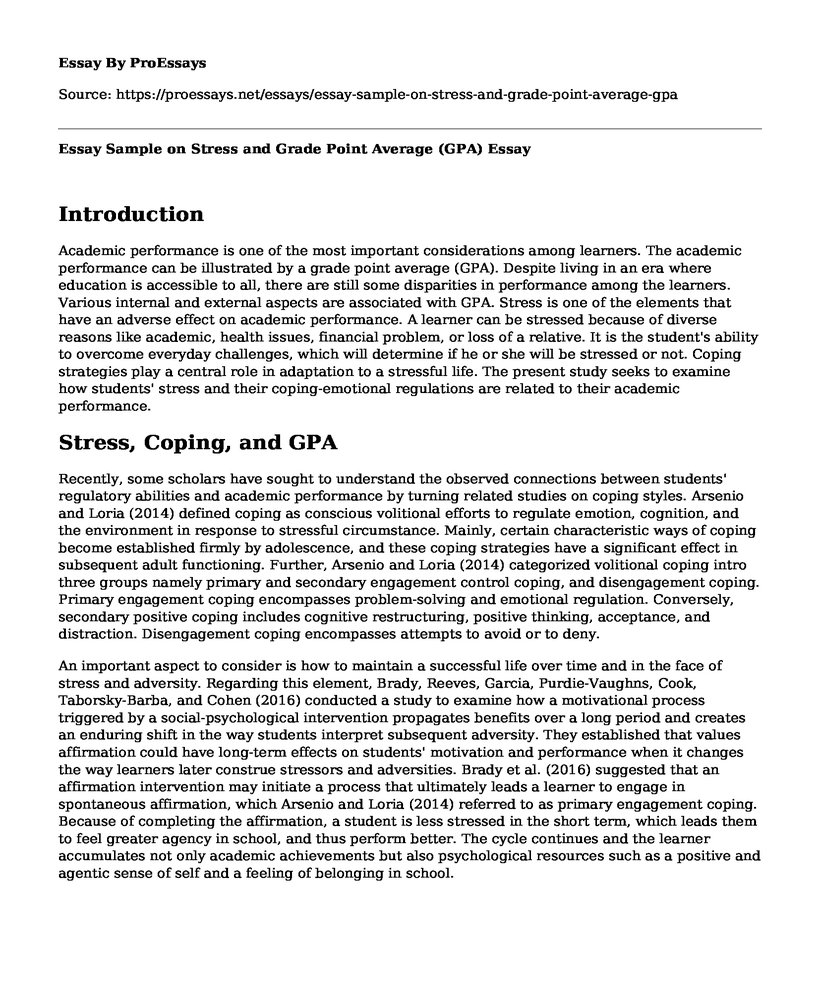Introduction
Academic performance is one of the most important considerations among learners. The academic performance can be illustrated by a grade point average (GPA). Despite living in an era where education is accessible to all, there are still some disparities in performance among the learners. Various internal and external aspects are associated with GPA. Stress is one of the elements that have an adverse effect on academic performance. A learner can be stressed because of diverse reasons like academic, health issues, financial problem, or loss of a relative. It is the student's ability to overcome everyday challenges, which will determine if he or she will be stressed or not. Coping strategies play a central role in adaptation to a stressful life. The present study seeks to examine how students' stress and their coping-emotional regulations are related to their academic performance.
Stress, Coping, and GPA
Recently, some scholars have sought to understand the observed connections between students' regulatory abilities and academic performance by turning related studies on coping styles. Arsenio and Loria (2014) defined coping as conscious volitional efforts to regulate emotion, cognition, and the environment in response to stressful circumstance. Mainly, certain characteristic ways of coping become established firmly by adolescence, and these coping strategies have a significant effect in subsequent adult functioning. Further, Arsenio and Loria (2014) categorized volitional coping intro three groups namely primary and secondary engagement control coping, and disengagement coping. Primary engagement coping encompasses problem-solving and emotional regulation. Conversely, secondary positive coping includes cognitive restructuring, positive thinking, acceptance, and distraction. Disengagement coping encompasses attempts to avoid or to deny.
An important aspect to consider is how to maintain a successful life over time and in the face of stress and adversity. Regarding this element, Brady, Reeves, Garcia, Purdie-Vaughns, Cook, Taborsky-Barba, and Cohen (2016) conducted a study to examine how a motivational process triggered by a social-psychological intervention propagates benefits over a long period and creates an enduring shift in the way students interpret subsequent adversity. They established that values affirmation could have long-term effects on students' motivation and performance when it changes the way learners later construe stressors and adversities. Brady et al. (2016) suggested that an affirmation intervention may initiate a process that ultimately leads a learner to engage in spontaneous affirmation, which Arsenio and Loria (2014) referred to as primary engagement coping. Because of completing the affirmation, a student is less stressed in the short term, which leads them to feel greater agency in school, and thus perform better. The cycle continues and the learner accumulates not only academic achievements but also psychological resources such as a positive and agentic sense of self and a feeling of belonging in school.
Conclusion
In summary, it is clear that students who have higher levels of negative general moods and adverse academically related effect have lower levels of academic performance. However, little is known concerning how adolescents cope with academic stress, and whether academic coping strategies are related to the students' overall GPA and previously observed affective correlates of academic performance. Hence, this research is designed to assess the hypothesis that the embracement of coping strategies by students would be associated with lower academic stress and higher GPAs. In general, it is anticipated that higher levels of coping would mediate the connections between academic stress and students' GPA. Notably, although no specific age-related differences are hypothesized, analyses will be conducted to examine possible differences in younger and older students. Finally, no gender differences are expected in the relations among the study variables.
References
Arsenio, W. F., & Loria, S. (2014). Coping with negative emotions: Connections with adolescents' academic performance and stress. The Journal of genetic psychology, 175(1), 76-90. DOI: 10.1080/00221325.2013.806293
Brady, S. T., Reeves, S. L., Garcia, J., Purdie-Vaughns, V., Cook, J. E., Taborsky-Barba, S., ... & Cohen, G. L. (2016). The psychology of the affirmed learner: Spontaneous self-affirmation in the face of stress. Journal of Educational Psychology, 108(3), 353. http://dx.doi.org/10.1037/edu0000091
Cite this page
Essay Sample on Stress and Grade Point Average (GPA). (2022, Dec 05). Retrieved from https://proessays.net/essays/essay-sample-on-stress-and-grade-point-average-gpa
If you are the original author of this essay and no longer wish to have it published on the ProEssays website, please click below to request its removal:
- Stumbling on Happines
- Self-Reflection: Motivation Paper Example
- Implications for the Treatment of PTSD - Essay Sample
- Paper Example on Altruistic Love Leads to Happier Marriages
- MSN Specializations at Walden University - Research Paper
- Paper Example on Developing Your Personal Leadership Philosophy
- Application Sample on Healthcare-Associated Infections: A Risk for Healthcare Providers & Patients







